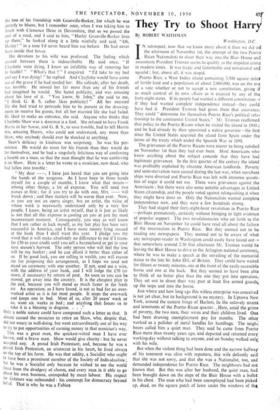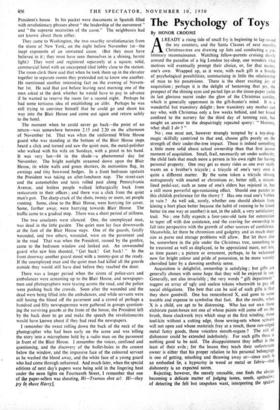4 ; 17 THE SPECTATOR, NOVEMBER 10, 1950
They Try to Shoot Harr
By ROBERT WAITHMAN Washington, D.C.
IN retrospect, now that we know more about it than we did or the afternoon of November 1st, the attempt of the two Puerto* Rican Nationalists to shoot their way into the Blair House and assassinate President Truman seems to qualify as the stupidest crime in modern times. It was tragic and lamentable and sensational and squalid ; but, above all, it was stupid.
- Puerto Rico, a West Indies island containing 3,500 square milea of fertile land and a population of about 2,000,000, was on the eve of a vote whether or not to accept a new constitution, giving ii as much control of its own affairs as is enjoyed by any of the, forty-eight states. If its people had wanted a different constitution-4 if they had wanted complete independence instead—they could have had it. President Truman had given them that assuranced They could "determine for themselves Puerto Rico's political rela- tionship to the continental United States." Mr. Truman reaffirmed that policy to the Puerto Ricans when he visited the island in 1948 ; and he had already by then appointed a native governor—the first since the United States acquired the island from Spain under the terms of the treaty which ended the Spanish War in 1898.
The grievances of the Puerto Ricans were nearer to being satisfied on November 1st than they had ever been. Most Americans who know anything about the subject concede that they have had legitimate grievances. In the first quarter of the century the island was profitably exploited by absentee American landlords. Poverty and semi-starvation were caused during the last war, when merchant ships were diverted and Puerto Rico was left with immense quanti- ties of sugar it could not use. There were grievances against the Americans ; but there were also some notable advantages in United States citizenship, and the people voted against relinquishing it when they might have done so. Only the Nationalists wanted completo independence now, and they were a few hundreds strong.
They had staged their forty-eight-hour revolution in Puerto Rico —perhaps prematurely, certainly without bringing to light evidence of popular support. The two revolutionaries who set forth to the Blair House on November 1st could have read all about the failure of the insurrection in Puerto Rico. But they seemed not to be reading any newspapers. They seemed not to be aware of what any newspaper-reader in Washington could easily have found out—i that somewhere around 2.30 that afternoon Mr. Truman would be leaving the Blair House to drive to the Arlington national ceremony, where he was to make a speech at the unveiling of the memorial Statue to the late Sir John Dill, of Britain. They could have waited for fifteen or twenty minutes, one at the front of the easily-accessible house and one at the back. But they seemed to have been able to think of no better plan than the one they'put into operation. They set out to shoot their way past at least five armed guards,: up the steps and into the house.
Just where and how long ago this witless enterprise was conceived is not yet clear, but its background is no mystery. In Uptown New York, around the eastern fringe of Harlem, lie the unlovely streets and tenements of the Puerto Rican quarter. ,Here, amid the grime of poverty, the two men, their wives and their children lived. On had been drawing unemployment pay for months. The other worked as a polisher of metal handles for handbags. ' The neigh; bours called him a quiet man. They said be came from Puerto' Rico more than twenty years ago, and departed and returned every, working-day without talking to anyone, and on Sunday walked only
with his wife. .
But when the violent thing had been done and the narrow hallway of his tenement was alive with reporters, this wife defiantly said that she was not sorry, and that she was a Nationalist, too, and demanded independence for Puerto Rico. The neighbours had not known that. But this was after her husband, the quiet man, had been brought down on the steps of the Blair House with a bullet in his chest. The man who had been unemployed had been picked up, dead, on the square patch of lawn under the windows of the, President's house. In his pocket were documents in Spanish filled with revolutionary phrases about " the leadership of the movement" and "the supreme necessities of the cause." The neighbours had not known about them either.
They came to Washington, the two swarthy revolutionaries from the slums of New York, on the night before November 1st—the inept exponents of an unwanted cause. (But they must have believed in it ; they must have seen themselves in a shining, heroic light.) They went and registered separately at a square, solid, commercial hotel with an uncarpeted tiled lobby close to the station.
The room clerk there said that when he took them up in the elevator together to separate rooms they pretended not to know one another.
He mentioned another, interesting fact on the evening of Novem- ber 1st. He said that just before leaving next morning one of the men asked at the desk whether he would have to pay in advance if he wanted to reserve the room for a second night. Perhaps he had some tortuous idea of establishing an alibi. Perhaps he was still trying to convince himself that he could go and shoot his way into the Blair House and come out again and return safely to the hotel.
The moment when he could never go back—the point of no return—was somewhere between 2.15 and 2.20 on the afternoon of November 1st. That was when the uniformed White House guard who was standing at the bottom of the Blair House steps heard a click and turned and saw the quiet man, the metal-polisher who walked with his wife on Sundays, with a pistol in his hand. It was very hot-84 in the shade—a phenomenal day for November. The bright sunlight streamed down upon the Blair House, its white walls and green shutters, its motionless flag, its awnings and tiny boxwood hedges. In a front bedroom upstairs the President was taking an after-luncheon nap. The street-cars and the automobiles and taxis rolled past along Pennsylvania Avenue, and hatless people walked lethargically back from restaurants to their offices ; and there was a click from the quiet man's gun. The sharp crack of the shots, twenty or more, set people running. Some, close to the Blair House, were hurrying for cover. Some, further away, were hurrying towards Blair House. The traffic came to a gradual stop. There was a short period of stillness.
The two assailants were silenced. One, the unemployed man, was dead in the little garden. The quiet man lay face downwards at the foot of the Blair House steps. One of the guards, fatally wounded, and two others, wounded, were on the pavement and in the road That was when the President, roused by the gunfire, came to the bedroom window and looked out. An unwounded guard who saw him shouted, "Get back ! Get back ! " In the front doorway another guard stood with a tommy-gun at the ready. If the unemployed man and the quiet man had killed all the guards outside they would still have died before they reached the door.
There was a longer period when the sirens of police-cars and ambulances were screaming up to the Blair House, and newspaper- men and photographers were tearing across the road, and the police were pushing back the crowds. Soon after the wounded and the dead were being lifted into the ambulances, and while servants were still hosing the blood off the pavement and a crowd of perhaps a hundred and fifty newspapermen were gathered in groups question- ing the surviving guards at the front of the house, the President left by the back door to go and make the speech the revolutionaries would have known about if they had read the newspapers.
I remember the sweat rolling down the back of the neck of the photographer who had been early on the scene and was telling the story into a microphone held by a radio man on the pavement jn front of the Blair House. I remember the voices, cOnfused and questioning, and the discovery of the bullet-holes in the cement below the window, and the impassive face of the coloured servant as he washed the blood away, and the white face of a young guard who had come through unharmed. And much later, when the special editions of next day's papers were being sold in the lingering heat under the neon lights on Fourteenth Street, I remember that one of the paper-sellers was shouting, Hi—Truman shot cut Hi—they iry it) shoot Harryl



















































 Previous page
Previous page